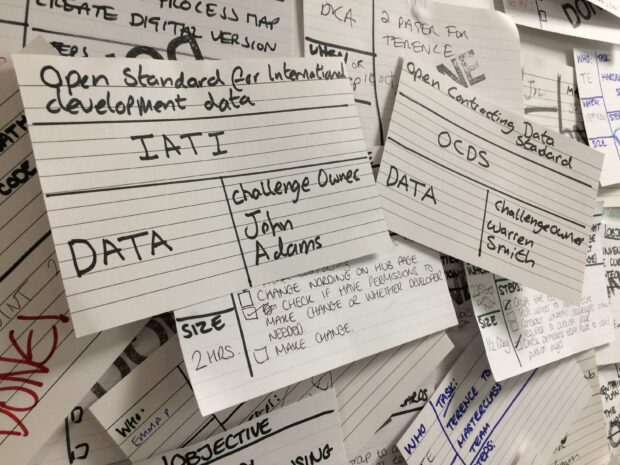
The Open Standards Board, which approves open standards for use in UK government, met in November 2016 to consider standards which had been proposed on the Open Standards Hub. During the session, we heard from two champions (challenge owners) of open data standards which have followed our four-step standards process.
Written by the champions of the two new standards this post explains the benefits of the chosen standards and ways in which they complement each other.
Adopting the latest standards
The latest standards selected through the open standards process support open access to data. These standards are:
Open data is at the heart of open government. To be effective open data needs open standard formats.
Our standards process showed that the standards featured in this post are robust and fit for purpose. Both have strong governance mechanisms and community support. The process also highlighted that the standards are based on user needs and continue to evolve as user needs change.
We hope that the UK’s formal adoption of these standards will provide others with the confidence to start publishing and improving open data.
IATI Data Standard
International development organisations need timely, comprehensive and forward-looking data to be effective. Without data, co-ordination becomes difficult, opportunities for efficient collaboration are lost, and fraud and corruption can be hidden.
The International Aid Transparency Initiative (IATI) Standard is the data standard for the exchange of information on international development activities, as this short video shows:
The UK government was the first organisation to publish in the IATI Standard in 2011, and there are currently over 500 publishers. The UK Aid Strategy (November 2015) commits all UK government departments and implementing partners of UK aid to meet global transparency standards, using IATI.
It is therefore important to underpin this strategic aim with full support for the IATI standard within UK government, through the standards process.
Open Contracting Data Standard
Citizens, civil society and businesses need to know that government and public sector organisations are awarding contracts fairly and appropriately to the right suppliers, getting the best value for money and helping to stimulate a competitive market for the supply of goods, services and works.
This helps to build trust and confidence in a government that’s more transparent in its planning, procurement, contract management and supplier relationship management, when spending taxpayers’ money.
The Open Contracting Data Standard (OCDS) structures the disclosure of data and documents at all stages of the contracting process by defining a common data model. By publishing consistently to the same standard, the barrier to data use is reduced, encouraging digital and technology innovation around public procurement in the UK, EU member states and international governments.
In May last year, the Cabinet Office announced a number of important commitments as part of the UK’s Open Government National Action Plan 2016-18, which are relevant to how we can improve and open up procurement and contracting data:
- being the first G7 country to implement the OCDS on its central purchasing authority
- extending our company register of people with significant control (PSC), to include foreign companies who own or buy property in the UK, or bid on central government public contracts
- creating a linked system of registers, starting with data categories for which the user need is greatest (countries, local authorities, schools and companies)
Building on this, the governments of Colombia, France, Mexico, Ukraine and the UK officially launched the ‘Contracting 5’ (C5) initiative at the Open Government Partnership (OGP) Global Summit 2016, which took place in Paris, France at the beginning of December 2016.
The C5 are leading the progress being made around using data to open and evaluate public procurement and achieve better value for money, a fairer and more competitive business environment, better goods and services, and reduced corruption in public contracting.
The Paris Declaration contains a range of collective actions - concrete cooperation, output-orientated that will produce tangible results - in the following areas:
- common digital tools and capacity
- climate change and sustainable development
- open parliament
- transparency, integrity and anti-corruption
Governments joining the collective action on open public procurement will help make the public contracting process open by default, by publishing contract and contracting information according to the OCDS. This will help tackle corruption, increase competitiveness, and improve public service delivery.
Working together
These standards can work together. For example; a school is being built in West Africa using funds from national and international organisations. The building is undertaken by a local Non-government Organisation (NGO) through a private sector contractor.
The flow of funding from the donors to the NGO is available through IATI data. Contracts between the NGO and the contractors for the building are visible through OCDS.
The result is that all stakeholders can see that aid money is delivering the correct outcome and the open visibility means that all parties can be made accountable.
Take part
We are currently looking for champions for new suggested challenges. If you would like to be the 'challenge owner' for these challenges visit the Open Standards Hub or contact us.
Stay up to date with all the latest posts by signing up to alerts from Government Technology blog, follow the conversation @GDSteam